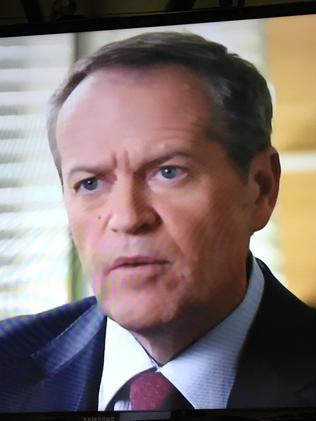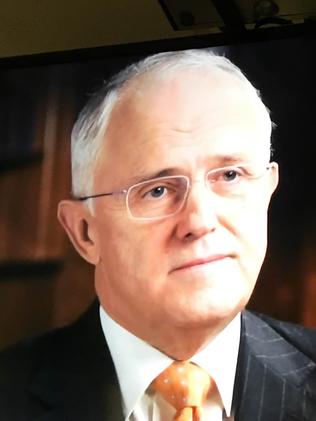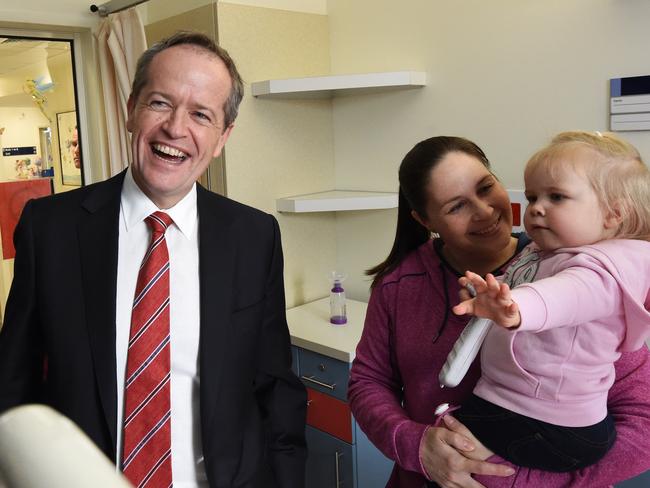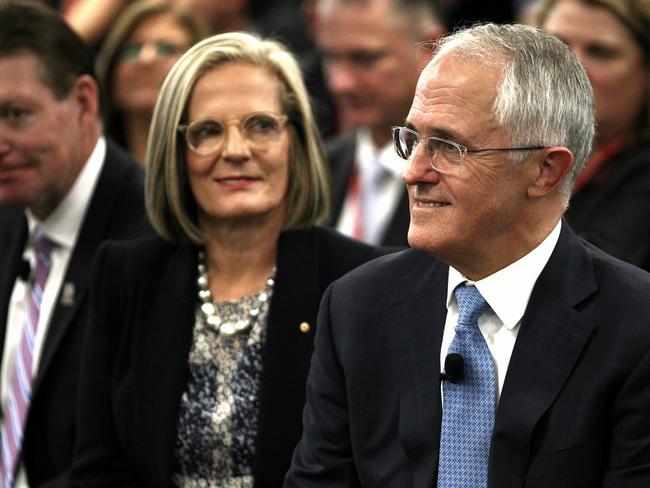Sarah Ferguson puts Malcolm Turnbull and Bill Shorten under the microscope
THE Prime Minister barely got a dozen words in before Sarah Ferguson interrupted him. Bill Shorten didn’t fare any better.
PRIME Minister Malcolm Turnbull and Opposition Leader Bill Shorten have endured a final test before Saturday’s election.
In Monday night’s episode of 4Corners, each party leader submitted to a probing interview with Walkley Award winning journalist Sarah Ferguson — and neither came out unscathed.
Ferguson grilled both men on their personal integrity, ability to steer the nation’s economy and pay for the increasingly expensive services we all need.
And unlike news.com.au’s Facebook live debate, where Mr Shorten was the clear winner, it was a very close call.
Ferguson tired of the Labor leader’s scripted responses, interjecting after one too many Medicare rants: “That sounds like a press conference, I’m going to move on.”
And while Mr Turnbull managed to keep his cool throughout most of his interview, his patience was tested by Ferguson’s persistent questioning.
“That’s just what I was going to say if you hadn’t interrupted me,” the PM said haughtily after being challenged on his decision to delay company tax cuts.
“The reason for that is that larger companies have longer investment time frames, and so if you offer a tax cut, say, eight years hence, big companies ... will make the investments today knowing that by the time those investments are generating profits, they will be paying less tax.”


In fact, Mr Turnbull only managed to get a dozen words out in response to the first question put to air before Ferguson cut in.
Asked what qualities he had that made him the best person to lead the nation, Mr Turnbull fumbled: “I have a vision for the future. Qualities ... I have an understanding—”
“Forgive me for interrupting. I mean, more in terms of your personal qualities,” Ferguson said.
Mr Turnbull replied with a list: Endurance. Resilience. Openness to new ideas.
For his part, Mr Shorten described his virtues as: “I never give up. I respect people to my core. I’m a listener.”
And he added that his view of leadership was “to be the coach”, not the full forward or the ruckman.
‘A PLAGUE ON BOTH YOUR HOUSES’
Ferguson challenged both leaders on the national debt, accusing them of “conducting an election campaign as if it were in a bubble”.
She asked Mr Turnbull why he had stopped talking about the looming problem of spiralling public health costs, which neither party has outlined a comprehensive plan to address.
“No-one’s talking about those problems. You used to. You’re not talking about them anymore,” Ferguson said.
“Well, we do talk about building a stronger economy,” Mr Turnbull replied.

Addressing Mr Shorten, she challenged: “What’s going to happen with that growth in spending? It’s a plague on both your houses.”
Hospital funding beyond the year 2020, when demand is forecast to spike, was the elephant in the room that Ferguson was determined to draw attention to.
“We’re the only party with a plan to reform our hospitals but make sure they don’t face savage cuts,” Mr Shorten retorted.
Mr Turnbull said the government “will always be continuing to support schools and hospitals as it always has ... You’re not seriously suggesting the federal government will suddenly stop funding health?”
A NEW ZEALAND SOLUTION?
It’s the antithesis of how both major parties have approached border control in recent years, but Mr Shorten left open the possibility of settling refugees in New Zealand.
Mr Turnbull rejected New Zealand’s offer to take 150 refugees from Australia’s offshore detention centres in April.
Vowing to send his immigration minister straight to the United Nations High Commissioner for Refugees if Labor wins the election, Mr Shorten pledged a new approach to the refugee crisis.
“Do you seriously think at the moment, with a world refugee crisis worse than anything since the Second World War, that a problem of a few thousand people in Australia should be a priority for the UN?” Ferguson asked incredulously.
“Why not just send [Opposition Immigration spokesman] Richard Marles straight to New Zealand? It’s cheaper than going to Geneva and you could get a solution straightaway.”
Crucially, Mr Shorten did not rule out a New Zealand solution, simply noting that “it’s a resettlement nation”.
When asked how they felt upon learning that two refugees on Nauru had self-immolated, both leaders expressed their horror.
But Mr Turnbull refused to acknowledge any responsibility for the fate of people in offshore detention centres, sticking to the line that the Papua New Guina and Nauru governments were responsible for running their centres.

LABOR’S ‘MEDISCARE’ CAMPAIGN
Ferguson was scathing in her dissection of Labor’s so-called “Mediscare” campaign, which makes the bold, and unsubstantiated claim that Mr Turnbull has a secret plan to scupper the universal healthcare system established by the Hawke Labor government.
“Medicare will never, ever be sold, never be privatised. Every element of Medicare services that is being delivered by the Government today will be delivered by the Government in the future. Full stop,” Mr Turnbull said.
Ferguson asked Mr Shorten why he was running what “looks like a fear campaign, a scare campaign, in the last period of the campaign because you’re facing defeat”.
But the Opposition Leader insisted that he had “caught the Government out”, sticking to his line that the fact a taskforce had been set up to privatise the payment system used to process publicly-funded transactions spelled doom for Medicare as a whole.
“The Government has ruled it out completely ... The medical establishment says it’s a scare campaign. Why do you persist with it?” Ferguson challenged.
Mr Shorten came back with a creative definition of privatisation, concluding that Mr Turnbull would take Australia “down the American path of a two-tier health system”.
But Ferguson refused to accept that changes to GP rebates and bulk billing incentives for pathology tests equated to privatising Medicare, an argument which the peak body for doctors had labelled “outrageous”.

WHO CAN VOTERS TRUST?
Ferguson subjected both party leaders to a sustained grilling on past matters reflecting on their characters and quality of personal judgment.
For Mr Turnbull, this was the 2009 Godwin Grech affair, in which then Opposition Leader Mr Turnbull accused Prime Minister Kevin Rudd of seeking preferential treatment for a Queensland car dealer who had sought financial assistance from a government agency.
It transpired that the source of the false accusation was a forged email by a Treasury official named Godwin Grech.
“The former head of Treasury Ken Henry says that he was very surprised and very disappointed by your behaviour over the Grech affair,” Ferguson said. “Are you still that same person?”
Mr Turnbull replied that while he was the same person, he had learned from his mistakes.
“I learned that you should not be, perhaps be less rash and less trusting of ... Things are not always as what they appear to be.”
The big question for Mr Shorten was how voters could trust a man who was instrumental in toppling not one, but two Labor prime ministers.
“Using the power that you have within the party to destroy somebody else’s career, because that’s effectively what you did,” Ferguson said.
Mr Shorten expressed regret over what he described as “very hard times,” while maintaining the line that he’d been following “conventional wisdom”.
“It’s a bit funny now I am the leader,” he said, when asked if he’d make a similar decision again.
“In hindsight, it all happened too quickly ... I think it showed a Labor Party which was more interested in its own arguments than the people.”
Asked when he had the “revelation” that “rampant factionalism” was not an asset to the party, Mr Shorten replied: “It’s been an evolving thing.”
“I’m not in the thrall of the unions,” he insisted.
Ferguson also challenged the Labor leader on the corruption problems in the militant Construction Forestry Mining and Energy Union — which former PM Bob Hawke has said should be disaffiliated from the party.
“Well, I don’t judge a whole union by the actions of individuals,” Mr Shorten replied.
“And I’m not responsible for what every union official says, just like I’m sure Malcolm Turnbull’s not responsible for every action that a banker takes.”




